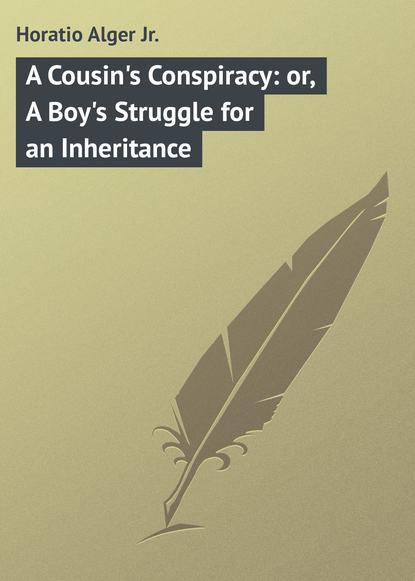По всем вопросам обращайтесь на: info@litportal.ru
(©) 2003-2024.
✖
A Cousin's Conspiracy: or, A Boy's Struggle for an Inheritance
Настройки чтения
Размер шрифта
Высота строк
Поля
“I know it, Mr. Robbins. I have been a bad man, but it is not too late to reform. If you’ll let me go I will leave Oreville to-night, and I will never trouble you again.”
“It isn’t me you have troubled. It is the boy. You robbed him, or tried to do it, at Oak Forks, and now you have turned up here.”
“I didn’t know he was here.”
“You didn’t know I was here, or I think you would have given the place a wide berth.”
“I am very sorry for what I did, and if you’ll only spare my life, I’ll promise to reform.”
“I haven’t much faith in your promises, but I’ll leave it to the boy. Ernest, what shall I do with this man?”
Ernest had come forward, and was standing but a few feet from Luke and his captive.
“If he promises to reform,” said Ernest, “you’d better give him another chance, Luke.”
“I am not sure that I ought to, but it is you to whom he has done the most harm. If you give him over to the miners we shall never be troubled by him again.”
Tom Burns turned pale, for he knew that life and death were in the balance, and that those two – Luke and the boy – were to decide his fate.
Ernest could not help pitying the trembling wretch. He was naturally kind-hearted, and at that moment he felt that he could forgive Burns all that he had done.
“Since you have left it to me, Luke,” he said, “let him go.”
“It shall be as you say, Ernest.”
As he spoke he released his hold, and Tom Burns stood erect. He breathed a deep sigh of relief.
“May I go?” he asked submissively.
“Yes.”
Before leaving he turned to Ernest.
“You are a good-hearted boy,” he said, “and I shall not forget that you have saved my life. If I am ever able to do anything for you, I will do it. You will find that Tom Burns, bad as he has been, knows how to be grateful.”
“I think you mean what you say,” returned Ernest. “I hope you will keep your promise and will turn over a new leaf. Is it true that you are penniless?”
“Not quite. This is all I have.”
Burns drew from his pocket a handful of small change – less than a dollar in all – and held it out for inspection.
“Then I will help you along.”
Ernest took from his pocket a five-dollar gold piece, and offered it to the tramp.
“That is more than I would do for him,” said Luke.
“It is more than I deserve,” replied Burns, “but you won’t be sorry for your kindness. If ever you see me again, I shall be a different man.”
He passed out of the window, and they saw him no more.
Luke and Ernest said very little of their night’s adventure, but the gold watch and the Mexican dollar were returned to the man from whom they had been taken.
Six months passed. Oreville had doubled its population, the mines had yielded a large sum in gold-dust, and the store presided over by Ernest was considerably enlarged.
His services had been so satisfactory that Horace Ames, whose time was taken up elsewhere, had raised his share of the profits to one-half.
At the end of six months, besides defraying his expenses, Ernest found himself possessed of a thousand dollars.
“Luke, I feel rich,” said he, when his faithful friend came round for a chat.
“You’ve done better than I have,” rejoined Luke. “The most I have been able to scrape together is four hundred dollars.”
“I will give you a part of my money, so that we may be even.”
“No, you won’t, Ernest. What do you take me for?”
“Mr. Ames has been very liberal, and that is why I have got so much. I don’t feel that I ought to have so much more than you.”
“Don’t bother about me, lad; I feel rich with four hundred dollars. I never was worth so much before, though I’m almost three times your age. And I wouldn’t have that but for you.”
“How do you make that out, Luke?”
“Because I never had any ambition till I met you. I never thought of saving money; as long as I got enough to eat I cared for nothing else. I should have died without enough to bury me if you had not set me the example of putting something by for a rainy day.”
“I am glad if I have done you any good, Luke, for you have been a kind friend to me.”
A week later Luke came into the store, holding a letter in his hand.
“Here is a letter for you, Ernest,” he said. “I was passing the post-office just now when I was hailed by the postmaster, who asked me if I would take the letter to you. I didn’t know that you had any correspondents.”
“Nor I, Luke. I think it is the first letter I ever received. Whom can it be from?”
“From some one who knows you are here. It is post-marked St. Louis.”
“Well, I can easily discover who wrote it,” said Ernest, as he cut open the envelope with his penknife.
He turned at once to the signature, and exclaimed, in great surprise, “Why, it’s from Tom Burns.”
“The man who tried to rob the store?”
“Yes.”
“He has probably written to ask you for some money.”
“No, Luke, you are mistaken. I will read it to you.”
The letter started thus:











